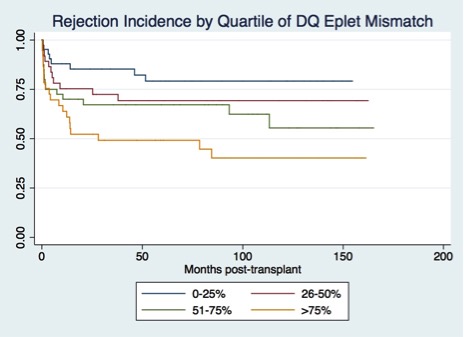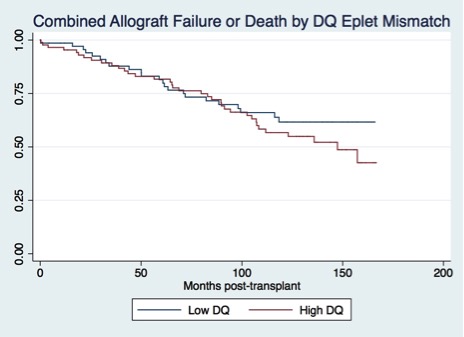Kidney Transplant Rejection Associated with DQ Eplet Mismatches.
1Medicine, University of Washington, Seattle, WA
2Bloodworks Northwest, Seattle, WA
3Pathology, University of Washington, Seattle, WA
Meeting: 2017 American Transplant Congress
Abstract number: 6
Keywords: Epitopes, HLA antibodies, HLA matching, Kidney transplantation
Session Information
Session Name: Concurrent Session: Assessing Risk for Antibody-Mediated Rejection in Kidney Transplant Recipients
Session Type: Concurrent Session
Date: Sunday, April 30, 2017
Session Time: 2:30pm-4:00pm
 Presentation Time: 2:42pm-2:54pm
Presentation Time: 2:42pm-2:54pm
Location: E354a
The presence of anti-HLA antibodies is associated with acute rejection, allograft dysfunction and earlier graft loss. HLA antibodies are recognized as being specific to these epitopes rather than the whole antigen, yet there is limited evidence that epitope mismatches predict worse allograft outcomes.
Associations between eplet mismatches and acute rejection, as well as 10-year allograft and patient survival were investigated with a single center retrospective study of adult primary kidney transplant recipients from 2003-2006 (n= 157). High resolution HLA typing was imputed from the low resolution patient data via Haplostats, applying the most commonly associated alleles for HLA-A, B, C, DR, DQ, then imported into HLAMatchmaker to calculate donor and recipient HLA eplets.
While Class I and DR eplet mismatches were not associated with the outcomes, >8 DQ mismatches were significantly and increasingly associated with acute rejection (OR 2.1, 95%CI: 0.81-5.41, p.0.013)  There was a trend toward association with allograft failure but not with death, or combined endpoint.
There was a trend toward association with allograft failure but not with death, or combined endpoint.  The hazard ratio for acute rejection, adjusted for age, gender and type of transplant, increased by quartiles of DQ eplet mismatches, with a 3.9 fold increased risk at the highest quartile.
The hazard ratio for acute rejection, adjusted for age, gender and type of transplant, increased by quartiles of DQ eplet mismatches, with a 3.9 fold increased risk at the highest quartile.
| DQ Eplet Mismatch Quartile | Hazard Ratio | 95% Confidence Interval |
| 0 (Reference Quartile) | ||
| 1 | 1.67 | 0.67-4.18 |
| 2 | 2.14 | 0.9-5.08 |
| 3 | 3.89 | 1.7-8.87 |
These findings highlight the risk of acute rejection in the setting of DQ eplet mismatch, while showing no signs of risk with Class I or DR mismatches, thereby supporting the need to further define pathogenic eplet mismatches.
CITATION INFORMATION: Chakola S, Warner P, Andeen N, Najafian B, Leca N, Blosser C. Kidney Transplant Rejection Associated with DQ Eplet Mismatches. Am J Transplant. 2017;17 (suppl 3).
To cite this abstract in AMA style:
Chakola S, Warner P, Andeen N, Najafian B, Leca N, Blosser C. Kidney Transplant Rejection Associated with DQ Eplet Mismatches. [abstract]. Am J Transplant. 2017; 17 (suppl 3). https://atcmeetingabstracts.com/abstract/kidney-transplant-rejection-associated-with-dq-eplet-mismatches/. Accessed March 5, 2026.« Back to 2017 American Transplant Congress
